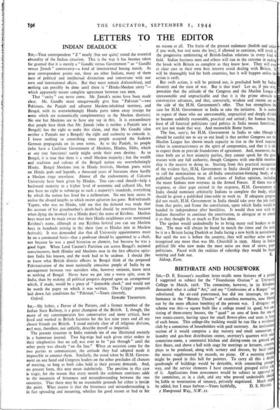ha,—My father, a Parsee of the Parsecs, and a former
member of the Indian State Railway, is a great champion of the British. I, though, like many of my contemporaries less conservative and more critical, have lived and worked in British factories for the last nine years and all my closest friends are British. I stand entirely clear of all religious division, and, may, therefore, not unfairly, describe myself as impartial.
The present situation in India reminds me of one illustrated recently in a humorous journal. Two big-wigs had each given strict orders to their telephonists that no call was ever to be " put through " until the other party was already " on the line." When an occasion came for the two parties to communicate, the attitude they had adopted made it impossible to connect them. Similarly, the stand taken by H.M. Govern- ment on one hand and Congress leaders on the other precludes all chances of meeting, so long as both sides hold to their present demands. And, on present form, this may mean indefinitely. The position in this case is tragic, for the reason that every month the stalemate continues adds to the mountain of bitterness and misunderstanding between the two countries. That there may be no reasonable grounds for either is beside the point. What counts is that the bitterness and misunderstanding is in fact spreading and mounting, whether for good reason or bad or for
no reason at all. The fruits of the present stalemate (foolish and unjust if you wish, but real none the less), if allowed to continue, will result in the progressive embittering of British-Indian relations in every kind of field. Indian business men and others will run to the extreme in making the break with Britain as complete as they know how. They will even at clear cost to their own best interest avoid dealing with Britain. It will be thoroughly bad for both countries, but it will happen unless the action is swift.
But swift action, it will be pointed out, is precluded both by Indian disunity and the state of war. But is that true? Let us, if you wish, postulate that the attitude of the Congress and the Muslim League is unreasonable and unpracticable and that it is the prime obstacle to constructive advances, and that, conversely, wisdom and reason are on the side of the H.M. Government's offer. 'That but strengthens the case for H.M. Government in India to take the initiative. It is useless to expect of those who are unreasonable, unpractical and deeply divided to become suddenly reasonable, practical and united ; for human beings, least of all fanatical politicians (and politics in India means fanaticism), are just not made that way. And meanwhile Rome burns.
The line, surety, for H.M. Government in India to take (though it should be careful not to say_so out loud) is that neither Congress nor the Muslim League has shown much capacity to rise to the level required either in constructiveness or the spirit of compromise, and that it is idle to expect them to provide foundations of agreement. And, moreover, that since both are at best minority parties, they cannot speak for the great masses with any full authority, though Congress with one-fifth member- ship is the nearest to doing so. Starting from this practical recognition of the evident fact, H.M. Government in India should proceed at once to call for nominations to an all-India constitution-forming body, of a published specification, from all sections of Indian opinion, including the many Indians now overseas in the Armed Forces. If there was no response, or clear gaps existed in the response, H.M. Government in India should nominate arbitrarily Indians to complete the body, which
should be given a published time-table to work to. If adequate progress
did not result, H.M. Government in India should take over the job itself, from that point, and frame the constitution, upon which India would be handed its independence after hostilities. It would then rest with the Indians thereafter to continue the constitution, to abrogate or to amend it as they thought fit, as much as Eire has done.
The upshot would undoubtedly be to bring many real leaders to
fore. The men will always be found to match the times and the need, be it in a Britain facing Dunkirk or India facing a new birth in nationhood.
But until the test is before the country, they will neither arise nor he recognised any more than was Mr. Churchill in 1939. Many in Indian political life who now make the most noise are men of straw, pare' politicians. Faced with the realities of rulership they would be found


























 Previous page
Previous page